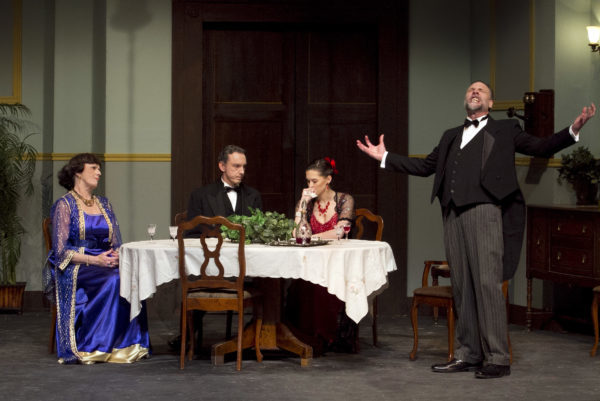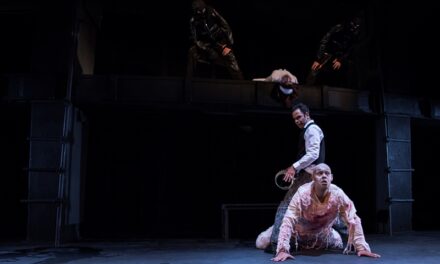Social responsibility and time, two of J.B. Priestley’s major preoccupations, are at the center of An Inspector Calls.
One of his best-known works, the drama is part social manifesto and part mystery in a drawing-room setting. With its underlying theme of the obligation to care for others and the playwright’s signature interest in time shifts, An Inspector Calls delivers strong criticism of class divisions in Great Britain immediately before the First World War as the scene is set for the mysterious inspector of the title to call on the wealthy Birling family and dent their complacency. An Inspector Calls, which premiered in Russia in 1945 and in England the next year, is frequently used as part of the British high school curriculum because of its value as an instrument of social history, as well as its interest as one of the classics of 20th-century drama.
The Ottawa Little Theatre production, as directed by Jim McNabb, moves swiftly through the wordy exposition as the Birling family celebrate their daughter’s engagement around the dining-room table — annoyingly placed front and center and blocking at least one cast member from view.
A further irritant is the fact that McNabb has called for the title character to shout, which means that in contrast to the normally finely tuned performance given by John Collins, we are given a single-note of noisy anger (a huge contrast to his recent subtly menacing, characterization of an SS officer in Bent by Martin Sherman.)
Katherine Williams, as Sheila, the daughter of the house, also spends too much of her time shouting, so lessening the quality of her otherwise clear characterization.
As her fiancé Gerald, Guy Newsham chooses to work at a more reasonable pitch. The result is a believable and interesting characterization.
As the senior Birlings, Janet Rice and Roy Van Hooydonk are clear in their view of the world that puts their own interests first, while their children are left to exhibit guilt and social conscience and, therefore, hope for the future.
While the production has some strong moments — the grouping and freezing of the cast in the final moments, for example — it also gives evidence of less successful directorial choices. One of these is the appearance of the ghostly representation of the young woman who committed suicide. Seeing her twirling like a music-box figure at various times detracts from (rather than underlining) the key point that each member of the family contributed to her sad end.
It is fortunate that the strength of the script maintains the momentum and the message of responsibility to each other.
An Inspector Calls continues at Ottawa Little Theatre to January 27.
Director: Jim McNabb
Set: Paul Gardner
Lighting: Barry Sims
Sound: Bradford MacKinlay
Costumes: Peggy Laverty
Cast:
Arthur Birling………………………………..Roy Van Hoooydonk
Gerald Croft…………………………………Guy Newsham.
Sheila Birling………………………………..Katherine Williams
Sybil Birling…………………………………Janet Rice
Edna…………………………………………Angela Petty
Eric Birling………………………………….Jamie Hegland
Inspector Goole……………………………..John Collins
This post originally appeared on Capital Critics’ Circle on January 12, 2018 and has been reposted with permission.
This post was written by the author in their personal capacity.The opinions expressed in this article are the author’s own and do not reflect the view of The Theatre Times, their staff or collaborators.
This post was written by Iris Winston.
The views expressed here belong to the author and do not necessarily reflect our views and opinions.


















